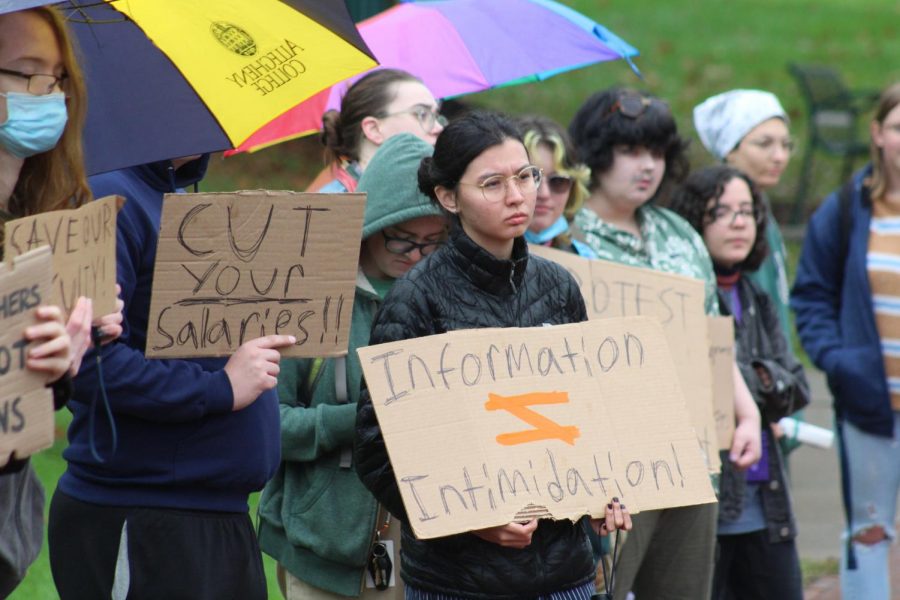Students protest task force, allegations of harassment
Misinformation surrounds academic review task force convened by Faculty Council
Students hold signs as they listen to speakers discuss the college administration’s response to a Thursday, Oct. 21 incident in a classroom where the Academic Program Review Task Force met, an incident that faculty members felt targeted and harassed by. The group was also protesting an estimated $1.5 million in staff salaries that the Board of Trustees wants to cut from faculty and staff salaries to financially stabilize the college.
Students organize
With chants of, “Save the staff, stop the cuts,” a line of students organizing under the banner of “AC Unite” stood opposite Bentley Hall on Brooks Walk on the morning of Friday, Oct. 22. They were there in support of faculty and in opposition to an email sent out the previous night by President Hilary Link and her cabinet regarding chalk markings across campus.
“I saw the email and was immediately frustrated because I knew exactly what was being talked about and I knew exactly what the email was referring to in terms of the staff cuts,” said Sydney Hammerman, ’25, one of the organizers of the protest. “My first reaction was that it was entitled and it made me very upset. So I sent a message into some (group) chats, talked to some people and was like, ‘We need to do something about this. There’s a lot of energy around this right now and we need to harness it, we need to speak out and have a protest.’”
But while the protestors were angry at the administration’s perceived sensitivity to criticism, Provost Ron Cole, ’87, clarified that the email was only sent out due to an incident on Thursday morning regarding the Academic Program Review Task Force, a group convened by the Faculty Council to advise the Provost on the planned $1.5 million in staff salaries the college is planning to cut.
“While the words themselves weren’t discriminatory, the fact that the messaging was in the space where that task force was meeting made that group of people feel targeted and harassed,” Cole said. “That’s the bottom line.”
Cole also separated the Thursday incident from other chalk messages across campus, some of which read, “Impeach Link,” and “Cut Link, Not the Staff.”
“This is not about the feelings of the administration,” Cole said. “The reason we wrote the message to the campus community after the incident of the chalking in the classroom was because that group of the Academic Review Task Force felt targeted by those messages, and they felt threatened by that. The chalkings on the sidewalk are not the same. We’re not erasing those. That’s not what our message was about.”
As per college policy, however, chalkings on the sides of buildings and on doors will be removed. The Compass, Allegheny’s Student Handbook, states, “Chalking is permitted on sidewalks exposed to the elements. Chalking is not allowed on walls, doors, or building exteriors.”
Transparency
Ian Manning, ‘22, walked by the Friday protest to see what was going on. While he did not sympathize with the chalking, he did question the college’s willingness to be open about what was happening.
“What I’d like to see from the administration is maybe a little more transparency about the whole process,” Manning said. “We never received an email from President Link (saying) ‘this is what’s going on … we’re paring down the faculty, these are the reasons.’ They never said anything and I think that’s the frustration that a lot of students have; (students) are only hearing about it now under the table from their friends.”
Similarly, June Gromis, ‘25, one of the organizers of Friday’s protest, charged the administration with failing to provide particulars about the situation.
“We have public spokespeople for the administration like President Link or Provost Cole who are making sweeping statements about the development and the nature of these staff cuts,” Gromis said. “But they’re not actually willing to provide fundamental information about this process, the people who are involved in the process, and the way that (the process) will actually occur.”
Hammerman also thought the lack of transparency was problematic.
“It is very unnerving and upsetting that there’s little to no transparency about this process when this process directly affects students and how their education persists,” Hammerman said. “Every single minute that (the administration) spends not being transparent is going to reflect more and more poorly on them. If they can’t trust the student body and the faculty body that they oversee as a college, the disconnect is going to continue to grow and it’s going to seem foolish for them to ask why.”
General Assemblies
In some ways, however, the administration has been transparent. On Sept. 28, Cole presented an update of the program review to the Allegheny Student Government General Assembly, outlining the process by which the review would continue, as well as some preliminary findings.
“That was a very important (assembly) in my opinion because it was right from the administrator who’s doing it,” said ASG President Noah Tart, ’22. “Ron Cole is the head of that process, and having him come to ASG and try to translate as much information as he could as possible.”
ASG as a whole has been noticeably absent from AC Unite’s movement, though both Cole and ASG Vice President Sophie Adams, ’22, cited the organization as a key pathway for students to speak to the administration.
“General Assembly is always open to constituents’ comments,” Adams said. “I was actually really surprised to not see any constituents at (the assembly on Tuesday) after the protests last week, because that really is the easiest way to have our attention.
Adams did note that there would not be a General Assembly on Nov. 2 due to the campus-wide day off.
However, Tart also said that the administration has not been as transparent as it could have been.
“In our communication with administration we’ve stressed a lot the importance of transparent information,” Tart said. “Sometimes there’s a lot of vague information that’s sent out in an email — perhaps with ‘fluff,’ for lack of a better phrase. We’ve communicated especially with people who are making these kinds of decisions that students really want succinct, concrete information that’s going to be easy to absorb and comprehend rather than information that you might have to sift through.”
Tart encouraged students to watch the Sept. 28 General Assembly, which he called, “very important.” A recording of the meeting is available on ASG’s Facebook page.
Adams also stressed that the program review was not guaranteed to end in cuts, but is instead designed to find places where the college can reduce spending without sacrificing the spirit of the college and wastefully cutting programs. Specifically, Adams suggested that, before cuts are considered, the contracts of visiting professors will not be renewed and retiring professors will not be replaced.
“To broadly just call them, ‘faculty cuts’ doesn’t get to the heart of the issue and is actually discounting the work being done by the task force as only looking for places where the school can save money,” Adams said. “It’s actually a way for the school to understand where to put their resources most efficiently. It’s something that every institution does and should not be held as unusual that Allegheny is undergoing this.”
Both Adams and Cole referred to the 2018 program review, which resulted in 23 faculty members accepting retirement incentives, thereby shrinking the number of professors without firing any. At the same time, however, Adams noted that that review added the Business major, which she said Economics students had been requesting for years.
“Reliable but anonymous”
The subtle change in vocabulary from “faculty cuts” to “program review” highlights the nuances often lost in the information spread online by AC Unite. Among the group’s talking points is the false claim that the task force was created by the administration.
“By creating the task force, (the task force) allows (the administration) to divide the staff and sow suspicions between the staff,” David Lawson, ’23, said to the protestors on Friday. “(The staff) cannot organize because they do not know who is reporting them and who might get fired.”
But according to both Cole and Faculty Council, a committee of faculty elected by their peers to ensure faculty representation in the college’s governance, the task force was not put together by the college administration. Rather, Faculty Council created the task force independent of the administration, as the best way to advise the Provost’s Office on where the proposed cuts can be made.
“Given the significance of the impact the Provost’s next staffing plan would have for the College, Council discussed how it could most effectively advise and inform the Provost as he made these staffing decisions,” the Council wrote in an email to The Campus. “Faculty Council decided that the most effective way to include faculty voices in this process would be to create an Academic Program Review Task Force. Council appointed a diverse group of respected faculty members drawn from different academic disciplines, backgrounds and faculty rank.”
According to that same statement, the task force’s report will be released to the entire college community in early December, and that report will be used by the Provost to construct the next staffing plan.
Another piece of misinformation regards the summer staff cuts announced at the end of July of this year. Neither the administration nor AC Unite disputes the fact that 36 positions were eliminated, of which 24 people actively serving in those positions were fired. But an unidentified student, reading from a document published anonymously, also charged that, “one such member of the faculty was set to undergo open heart surgery, and needed to beg for six more months of extended health insurance.”
However, when the cuts were announced in July, Vice President for Enrollment Management Ellen Johnson said, “Employees who were separated from the institution were provided severance packages as well as an extension of their benefits that the college is contributing toward for six months. So while they were not given advance notice, they were provided different financial pieces as a part of their separation.”
Cole cited the misinformation as a much bigger problem in the process than student action, and offered to correct the information to AC Unite’s documentation in order to bolster student voice.
“I have no problem with students declaring their concern over the possibility of eliminating part of an academic program,” Cole said. “That’s natural. But if there’s also misinformation or misguided information that those students are either receiving or assuming, that’s not good … I’m familiar with the AC Unite posting and I’d love to go through (the document) with that group at some point — I’d like to help inform the protests that I hear. ‘Here’s the information as I see it that’s as straightforward as possible. Here’s where I could help correct, if you will, some of the information and the way it’s being presented.’ I think there’s confusion and I can help clarify that.”
For their part, AC Unite is not going to stop spreading the information they claim is, “reliably but anonymously sourced.”
“Getting this information out there, getting people aware of what is happening, is just a process that’s beginning to burgeon,” Gromis said. “As we are able to spread this information, I think more and more people are going to realize the effects that this has on the professors they love and also on the departments and majors and minors and courses that they love.”
Several students walking by the Friday protest declined to comment because they did not feel they knew enough about the situation to speak on it.
Making Cents
The original reason for the staff cuts are changes in long-term trends, according to Cole. Publicly available data shows that Allegheny’s enrollment has dropped from 2,104 full-time students in the fall of 2012, to just 1,538 full-time students in the fall of 2021. This, Cole said, means that not every program can stay if the college is to remain financially stable.
“The reality is that we may not be able to deliver the same breadth of academics that we have in the past,” Cole said. “The reason for that is we have hundreds of fewer students now than we had in the past. Allegheny is a tuition-dependent institution; because we have fewer students, therefore we have less revenue for supporting the same number of employees. It’s not sustainable.”
Sasha Lu, ’25, another member of AC Unite, argued that the school is not that reliant on tuition revenue. Instead of cutting faculty, they said, the college should pull more from its endowment.
“We’re running under the percent of our endowment that most other universities do,” Lu said. “There’s money there that can be pulled from, but there’s just this question of them not wanting to.”
A school’s endowment is a long-term investment that is designed to slowly grow while also providing revenue for the school. Because the investment grows at an expected rate, the school can pull a set rate from the endowment without shrinking it. In Allegheny’s case, the Board of Trustees has set that rate at 4.25%, though it has the power to raise it.
“It’s not that easy,” Cole said. “There’s a limit to what we’re allowed to draw from the endowment, and even with that limit, it would not be sufficient to support maintaining what we have now.”
AC Unite also suggested that the college’s recent windfall through the “Our Allegheny: Our Third Century Quest’’ fundraising campaign that brought in over $200 million to the college could also be used to support the faculty. But Cole said that that is exactly what is happening through the endowment.
“It’s not a savings account that gets drawn down,” Cole said. “It’s to provide long-term intergenerational integrity for the institution. The larger that endowment is, the more dollars are provided to the operating budget with the same percentage of draw.”
Defending the liberal arts
Ultimately, Cole will create the new staffing plan. In an email to the faculty on Oct. 27, Cole wrote, “It is the responsibility of the Provost, not the Task Force, to prepare a faculty staffing plan and for making decisions about specific faculty lines and academic programs.”
The task force is solely responsible for creating guiding principles and recommendations for Cole to work with.
“They’re not making decisions on staffing,” Cole said. “They’re coming up with the criteria that makes sense to try to support (Allegheny’s mission). ‘How do we best support the Allegheny mission? How do we best support the Allegheny student experience?’ I am deeply committed to the liberal arts experience. I’m an Allegheny alum, I majored in geology and minored in music. I understand the importance of diverse ways of learning and knowing the world.”
But AC Unite wants the college to continue every program in the spirit of a liberal arts education.
“Allegheny is a college of catering to the individual,” Hammerman said. “That’s one of the things that stood out to me when I toured (here). For example, I want to minor in Jewish Studies. That’s like, negative two people do that. The reason I came to this school is because even though there’s not a lot of interest in some of the things I want to do, there is still a space for me to pursue them.”
Lu thinks that without smaller departments and programs, Allegheny does not have a reason to exist.
“If you don’t want to have those programs that only a few people are in, then just dissolve your school,” Lu said. “There’s a reason why I went here and not to Penn State (University). I was originally going to become an environmental engineer, but I ended up compromising that to go here specifically so I could do more things. That’s the draw of this school. If you get rid of the draw, then there’s no reason for people to go here than anywhere else.”
But this fierce defense of the spirit of Allegheny is ultimately the goal of the task force itself, according to Faculty Council.
“The charge that Faculty Council has laid on the Academic Program Review Task Force is immense,” Council wrote in an email to The Campus. “We have asked them, during an incredibly difficult time in the college’s history, to give voice to the values of the faculty regarding the college’s academic programs.”
Craig Dodge, associate professor of mathematics and chair of Faculty Council said that the best way for students to support their professors was to show up in the classroom.
“Anyone who wants to support faculty at this moment, needs only to show how much they value the faculty member’s work,” Dodge wrote in an email to The Campus. “The most meaningful experience a faculty member can ever have is to have their students fully engaged in the process of learning in their classrooms, to bring their best academic selves to their coursework, and that for any professional, that’s the highest reward of all.”

Sami Mirza is a senior from many different places. He is majoring in International Studies with a focus on the Middle East and North Africa and minor in...













FAAFO • Oct 29, 2021 at 9:03 pm
Interesting that the President thought now was a good time to buy a tricked-out golf cart to carry her from her home on Jefferson St (which the College owns and maintains) to her new office in Bentley Hall. Gossip Squirrel hears that the cart and modifications cost at least $10K.